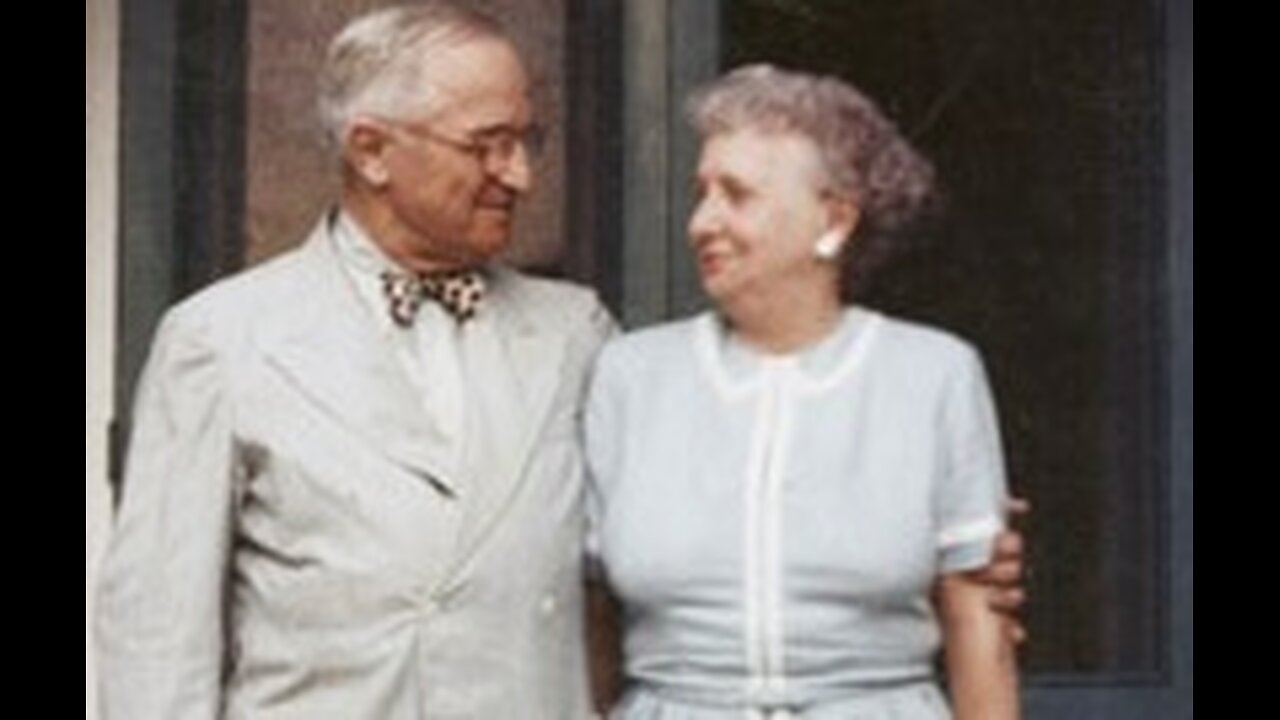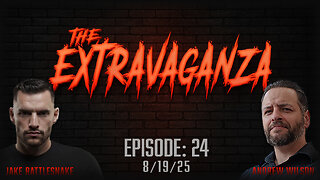Premium Only Content

The Origin and Development of the CIA under President Harry S. Truman (1994)
John Lewis Gaddis (born April 2, 1941) is an American military historian, political scientist, and writer. He is the Robert A. Lovett Professor of Military and Naval History at Yale University.[1] He is best known for his work on the Cold War and grand strategy,[1] and he has been hailed as the "Dean of Cold War Historians" by The New York Times.[2] Gaddis is also the official biographer of the prominent 20th-century American diplomat and historian George F. Kennan.[3] George F. Kennan: An American Life (2011), his biography of Kennan, won the 2012 Pulitzer Prize for Biography or Autobiography.[4]
Biography
Gaddis was born in Cotulla, Texas, the son of Harry Passmore Gaddis and his wife Isabel Florence (Maltsberger) Gaddis.[5][6] He attended the University of Texas at Austin, receiving his BA in 1963, MA in 1965, and PhD in 1968,[7][8] the latter under the direction of Robert Divine. Gaddis then taught briefly at Indiana University Southeast, before joining Ohio University in 1969.[7] At Ohio, he founded and directed the Contemporary History Institute,[9] and was named a distinguished professor in 1983.[7]
In the 1975–77 academic years, Gaddis was a visiting professor of Strategy at the Naval War College. In the 1992–93 academic year, he was the Harmsworth Visiting professor of American History at Oxford.[10] He has also held visiting positions at Princeton University and the University of Helsinki. He served as president of the Society for Historians of American Foreign Relations in 1992.[11]
In 1997, he moved to Yale University to become the Lovett Professor of Military and Naval History. In the 2000–01 academic year, Gaddis was the George Eastman Professor at Oxford, the second scholar (after Robin Winks) to have the honor of being both Eastman and Harmsworth professor.[12] In 2005, he received the National Humanities Medal.[13] He sits on the advisory committee of the Wilson Center's Cold War International History Project,[14] which he helped establish in 1991.[13] Gaddis is also known for his close relationship with the late George Kennan and his wife, whom Gaddis described as "my companions".[15]
Scholarship
Gaddis is probably the best known historian writing in English about the Cold War.[16] Perhaps his most famous work is the highly influential Strategies of Containment (1982; rev. 2005),[17] which analyzes in detail the theory and practice of containment that was employed against the Soviet Union by Cold War American presidents, but his 1983 distillation of post-revisionist scholarship similarly became a major channel for guiding subsequent Cold War research.[18]
We Now Know (1997) presented an analysis of the Cold War through to the Cuban Missile Crisis that incorporated new archival evidence from the Soviet bloc.[19] Fellow historian Melvyn Leffler named it as "likely to set the parameters for a whole new generation of scholarship".[20] It was also praised as "the first coherent and sustained attempt to write the Cold War's history since it ended."[21] Nonetheless, Leffler observed that the most distinctive feature of We Now Know is the extent to which Gaddis "abandons post-revisionism and returns to a more traditional interpretation of the Cold War."[22]
The Cold War (2005), praised by John Ikenberry as a "beautifully written panoramic view of the Cold War, full of illuminations and shrewd judgments,"[23] was described as an examination of the history and effects of the Cold War in a more removed context than had been previously possible,[24] and won Gaddis the 2006 Harry S. Truman Book Prize.[25] Critics were less impressed, with Tony Judt summarising the book as "a history of America's cold war: as seen from America, as experienced in America, and told in a way most agreeable to many American readers,"[26] and David S. Painter writing that it was a "carefully crafted defense of US policy and policymakers" that was "not comprehensive."[16]
His 2011 biography of George Kennan garnered multiple prizes, including a Pulitzer.[4]
John Nagl, in the Wall Street Journal, wrote of Gaddis's 2018 book On Grand Strategy as "a book that should be read by every American leader or would-be leader".[27]
Gaddis is known for arguing that Soviet leader Joseph Stalin's personality and role in history constituted one of the most important causes of the Cold War. Within the field of U.S. diplomatic history, he was originally most associated with the concept of post-revisionism, the idea of moving past the revisionist and orthodox interpretations of the origins of the Cold War to embrace what were (in the 1970s) interpretations based upon the then-growing availability of government documents from the United States, Great Britain and other western government archives.[citation needed] Due to his growing focus on Stalin and leanings toward US nationalism, Gaddis is now widely seen as more orthodox than post-revisionist.[28][29] The revisionist Bruce Cumings had a high-profile debate with Gaddis in the 1990s, where Cumings criticized Gaddis as moralistic and lacking in objectivity.[30]
Political positions
Gaddis is close to President George W. Bush, making suggestions to his speech writers,[31] and has been described as an "overt admirer" of the 43rd President.[32] After leaving office, Bush took up painting as a hobby at Gaddis's recommendation.[33]
During the US invasion of Iraq, Gaddis argued: "The world now must be made safe for democracy, and this is no longer just an idealistic issue; it's an issue of our own safety."[34] During the United States occupation of Iraq, Gaddis asserted that Bush had established America "as a more powerful and purposeful actor within the international system than it had been on September 11, 2001." Historian James Chace argues that Gaddis supports an "informal imperial policy abroad."[35] Gaddis believes that preventive war is a constructive part of American tradition, and that there is no meaningful difference between preventive and pre-emptive war.[36]
About the Trump presidency he has said, "We may have been overdue for some reconsideration of the whole political system. There are times when the vision is not going to come from within the system and the vision is going to come from outside the system. And maybe this is one of those times."[37]
Quotes
"Stalin's postwar goals were security for himself, his regime, his country, and his ideology, in precisely that order."[38]
"Assuming stability is one of the ways ruins get made. Resilience accommodates the unexpected."[39]
"Learning about the past liberates the learner from oppressions earlier constructions of the past have imposed upon them."[40]
"[A]lthough the past is never completely knowable, it is more knowable than the future."[40]
"Common sense, in this sense, is like oxygen: the higher you go, the thinner it gets."[39]
Awards and distinctions
U.S. President George W. Bush and First Lady Laura Bush standing with 2005 National Humanities Medal recipient John Lewis Gaddis on November 10, 2005, in the Oval Office at the White House.
2012 – Pulitzer Prize for Biography or Autobiography[4]
2012 – American History Book Prize[41]
2011 – National Book Critics Circle Award, Biography[42]
2006 – Harry S. Truman Book Award[25]
2005 – National Humanities Medal[13]
2003 – Yale Phi Beta Kappa DeVane Medalist for undergraduate teaching[43]
2000 – Eastman Professor at the University of Oxford[44]
1996 – Fulbright Scholar to Poland[45]
1995 – Fellowship of the American Academy of Arts and Sciences[46][47]
1995 – Wilson Center Fellowship[48][49]
1993 – Whitney H. Shepardson Fellowship[50]
1992 – Harmsworth Professor of American History at the University of Oxford[10]
1992 – Presidency of the Society for Historians of American Foreign Relations[11]
1986 – Guggenheim Fellowship[51]
1983 – Distinguished Professor of Ohio University[52]
1980 – Fulbright Scholar to Finland[45]
1973 – Bancroft Prize[53]
1973 – National Historical Society Prize[54]
1973 – Stuart L. Bernath Prize[55]
Selected publications
Books
Library resources
By John Lewis Gaddis
Resources in your library
Resources in other libraries
External videos
video icon Q&A interview with Gaddis on On Grand Strategy, May 27, 2018, C-SPAN
video icon After Words interview with Gaddis on George F. Kennan: An American Life, March 3, 2012, C-SPAN
video icon Interview with Gaddis on George F. Kennan, September 22, 2012, C-SPAN
video icon Presentation by Gaddis on George F. Kennan, September 22, 2012, C-SPAN
video icon Presentation by Gaddis on The Cold War: A New History, February 1, 2006, C-SPAN
video icon Booknotes interview with Gaddis on Surprise, Security, and the American Experience, May 16, 2004, C-SPAN
video icon Presentation by Gaddis on We Now Know: Rethinking Cold War History, April 3, 1997, C-SPAN
On Grand Strategy. New York, New York: The Penguin Press. 2018. ISBN 978-1-594-20351-0.[56]
George F. Kennan: An American Life. New York, NY: The Penguin Press. 2011. ISBN 978-1-594-20312-1.
The Cold War: A New History. New York, NY: The Penguin Press. 2005. ISBN 978-1-594-20062-5. US edition
The Cold War. London: Allen Lane. 2005. ISBN 978-0-713-99912-9. UK edition
Surprise, Security, and the American Experience. Cambridge, MA: Harvard University Press. 2004. ISBN 978-0-674-01174-8.
The Landscape of History: How Historians Map the Past. New York, NY: Oxford University Press. 2002. ISBN 978-0-195-06652-4.
(Co-editor with Philip H. Gordon, Ernest R. May and Jonathan Rosenberg). Cold War Statesmen Confront the Bomb: Nuclear Diplomacy Since 1945. Oxford: Oxford University Press. 1999. ISBN 978-0-198-29468-9.
We Now Know: Rethinking Cold War History. Oxford: Clarendon Press. 1997. ISBN 978-0-198-78070-0.
The United States and the End of the Cold War: Implications, Reconsiderations and Provocations. New York, NY: Oxford University Press. 1992. ISBN 978-0-195-05201-5.
The Long Peace: Inquiries into the History of the Cold War. New York, NY: Oxford University Press. 1987. ISBN 978-0195043365.
Strategies of Containment: A Critical Appraisal of Postwar American National Security Policy. New York, NY: Oxford University Press. 2005 [1982]. ISBN 978-0195174489.
Russia, the Soviet Union and the United States: An Interpretive History. New York, NY: McGraw-Hill. 1990 [1978]. ISBN 978-0-075-57258-9.
The United States and the Origins of the Cold War, 1941–1947. New York, NY: Columbia University Press. 2000 [1972]. ISBN 978-0-231-12239-9.
Articles and chapters
"Grand Strategies in the Cold War". In Melvyn P. Leffler and Odd Arne Westad, eds., The Cambridge History of the Cold War, Volume II: Crises and Détente (pp. 1–21). Cambridge: Cambridge University Press. 2010. ISBN 978-0-521-83720-0.
"Ending Tyranny: The past and future of an idea". The American Interest (Sep–Oct 2008). Archived from the original on 25 May 2013. Retrieved 15 April 2013.
Gaddis, John Lewis (2005). "Grand Strategy in the Second Term". Foreign Affairs. 84 (1): 2–15. doi:10.2307/20034202. JSTOR 20034202.
"A Grand Strategy of Transformation". Foreign Policy (Nov–Dec 2002): 50–57. Retrieved 15 April 2013.
"On Starting All Over Again: A Naïve Approach to the Study of the Cold War". In Odd Arne Westad, ed., Reviewing the Cold War: Approaches, Interpretations, Theory (pp. 27–42). London & Portland, OR: Frank Cass. 2000. ISBN 978-0-714-65072-2.
Gaddis, John Lewis (1996). "On Moral Equivalency and Cold War History". Ethics & International Affairs. 10: 131–148. doi:10.1111/j.1747-7093.1996.tb00007.x. S2CID 145147000. Archived from the original on 2000-08-17.
Gaddis, John Lewis (1993). "The Tragedy of Cold War History". Diplomatic History. 17 (1): 1–16. doi:10.1111/j.1467-7709.1993.tb00156.x.
Gaddis, John Lewis (1992). "The Cold War, the Long Peace, and the Future". Diplomatic History. 16 (2): 234–246. doi:10.1111/j.1467-7709.1992.tb00499.x.
Gaddis, John Lewis (1991). "The Soviet Side of the Cold War: A Symposium: Introduction". Diplomatic History. 15 (4): 523–526. doi:10.1111/j.1467-7709.1991.tb00145.x.
Gaddis, John Lewis (1990). "New Conceptual Approaches to the Study of American Foreign Relations: Interdisciplinary Perspectives". Diplomatic History. 14 (3): 405–424. doi:10.1111/j.1467-7709.1990.tb00098.x.
Gaddis, John Lewis (1989). "Intelligence, Espionage, and Cold War Origins". Diplomatic History. 13 (2): 191–212. doi:10.1111/j.1467-7709.1989.tb00051.x.
Gaddis, John Lewis (1983). "The Emerging Post-Revisionist Synthesis on the Origins of the Cold War". Diplomatic History. 7 (3): 171–190. doi:10.1111/j.1467-7709.1983.tb00389.x.
"The Cold War: Some Lessons for Policy Makers". Naval War College Review. 27 (3): 2–15. 1974.
See also
Containment
Historiography of the Cold War
References
"Yale Department of History » John Gaddis". history.yale.edu. Retrieved 3 April 2013.
Priscilla Johnson McMillan (25 May 1997). "Cold Warmonger". The New York Times. Retrieved 2 April 2013.
Douglas Brinkley (17 February 2004). "Celebrating a Policy Seer And His Cold War Insight". The New York Times. Retrieved 19 August 2013.
Profile of Kennan on his 100th birthday, includes several paragraphs detailing his relationship with Gaddis.
"The 2012 Pulitzer Prize Winners: Biography or Autobiography". pulitzer.org. Retrieved 2 April 2013.
"Gaddis, John Lewis 1941- | Encyclopedia.com". www.encyclopedia.com. Retrieved 2024-03-05.
Alden Branch, Mark. "Days of Duck and Cover". Yale Alumni Magazine (March 2000). Retrieved 3 April 2013.
"Historians will debate Cold War". The Lewiston Daily Sun. 23 January 1989. Retrieved 2 April 2013.
"Princeton University Library Finding Aids: 'John Lewis Gaddis Papers on George F. Kennan, 1982–1989', Collection Creator Biography". findingaids.princeton.edu. Retrieved 2 April 2013.
"Honorary Alumni: John Lewis Gaddis". Ohio University Today (Fall 1990): 6. 1990. Retrieved 7 April 2013.
"Harold Vyvyan Harmsworth Visiting Professor of American History". rai.ox.ac.uk. Archived from the original on 24 June 2013. Retrieved 11 May 2013.
"Past Presidents". shafr.org. Archived from the original on 10 August 2018. Retrieved 2 April 2013.
"Winks honored by Oxford, National Parks". Yale Bulletin & Calendar. 27 (31). 1999. Archived from the original on 3 November 2012. Retrieved 3 April 2013.
"Awards & Honors: 2005 National Humanities Medalist John Lewis Gaddis". neh.gov. Retrieved 2 April 2013.
"CWIHP Advisory Committee". wilsoncenter.org. 2011-07-15. Retrieved 2 April 2013.
Costigliola 2011.
Painter 2006, p. 527.
Leffler 1999, p. 503, which describes Strategies of Containment as "one of the most influential books ever written on post-World War II international relations."
Hogan 1987, p. 494.
CIRIS. "Containment - Center for International Relations and International Security". www.ciris.info. Retrieved 2023-11-25.
Leffler 1999, p. 502.
Ascherson 1997.
Leffler 1999, p. [page needed]
Ikenberry 2006.
Michael C. Boyer (22 January 2006). "A world divided: A leading historian evaluates the causes and ultimate collapse of the Cold War". Boston Globe. Retrieved 26 September 2013.
"John Lewis Gaddis Wins 2006 Harry S. Truman Book Award". trumanlibrary.org. 16 April 2006. Archived from the original on July 26, 2006. Retrieved 2 April 2013.
Judt 2006.
Nagl, John (16 April 2018). "'On Grand Strategy' Review: The War Against Decline and Fall". The Wall Street Journal. Retrieved 27 May 2018.
America in the World: The Historiography of US Foreign Relations Since 1941, edited by Michael J. Hogan (Cambridge University Press, 2013), p.8-10
"The Origins of the Cold War" Seth Center, University of Virginia
America in the World: The Historiography of US Foreign Relations Since 1941, edited by Michael J. Hogan (Cambridge University Press, 2013), p.10-14
Gaddis 2008.
Hartung 2003 criticizes Gaddis for holding a "relatively positive assessment" of post-9/11 Bush foreign policy.
Jonathan Haslam (17 April 2012). "George F Kennan: An American Life by John Lewis Gaddis – review". The Guardian. theguardian.com. Retrieved 29 August 2013.
Baker, Dorie (April 26, 2013). "Yale professor's advice to former U.S. president: Paint". YaleNews. Yale University. Archived from the original on May 4, 2013. Retrieved May 9, 2013.
Rauchway, Eric (15 March 2012). "Alterman on Gaddis on Kennan. - The Edge of the American West". The Chronicle of Higher Education. Retrieved 2019-02-20.
Chace, James (2004-10-07). "Empire, Anyone?". New York Review of Books. ISSN 0028-7504. Retrieved 2019-02-20.
"Gaddis: Bush Pre-emption Doctrine The Most Dramatic Policy Shift Since Cold War". Council on Foreign Relations. Retrieved 2019-02-20.
Baker, Peter (2019-12-18). "A President Impeached, and a Nation Convulsed". The New York Times. ISSN 0362-4331. Retrieved 2019-12-19.
Gaddis, John Lewis (2005). The Cold War: A New History. New York: Penguin Press. ISBN 1-59420-062-9. OCLC 61303540.
Gaddis, John Lewis (2018). On Grand Strategy. New York. ISBN 978-1-59420-351-0. OCLC 993691628.
Gaddis, John Lewis (2002). The Landscape of History: How Historians Map the Past. Oxford. ISBN 978-1-4294-3109-5. OCLC 77846078.
"New-York Historical Society Awards Its Annual American History Book Prize to John Lewis Gaddis for George F. Kennan: An American Life". nyhistory.org. 16 February 2012. Retrieved 2 April 2013.
"All Past National Book Critics Circle Award Winners and Finalists". bookcritics.org. Archived from the original on 18 October 2015. Retrieved 2 April 2013.
"DeVane Medalists, 1966–Present". pbk.yalecollege.yale.edu. 8 November 2005. Retrieved 16 June 2015.
"Eastman Professors at the University of Oxford". americanrhodes.org. Retrieved 12 May 2013.
"Fulbright Alumni » Notable Fulbrighters". eca.state.gov. Retrieved 4 April 2013.
"Gaddis Named to American Academy of Arts and Sciences". ohio.edu. May 1995. Archived from the original on 13 March 2016. Retrieved 4 April 2013.
"Alphabetical Index of Active AAAS Members as of 5 November 2013" (PDF). amacad.org. Retrieved 20 April 2014.
"Notable Achievements of Members". Perspectives. 33 (6). 1995. Retrieved 2 April 2013.
"Ohio University Historian Selected as Woodrow Wilson Fellow". ohio.edu. April 1995. Archived from the original on 8 March 2016. Retrieved 4 April 2013.
"The Whitney H. Shepardson Fellowship". cfr.org. Retrieved 16 June 2015.
"John Lewis Gaddis: 1986 Fellow, U.S. History". gf.org. Archived from the original on 4 April 2013. Retrieved 2 April 2013.
"Distinguished Professors (Current–1959)". ohio.edu. Retrieved 28 October 2020.
"The Bancroft Prizes: Previous Awards". library.columbia.edu. Archived from the original on 10 April 2013. Retrieved 2 April 2013.
Gaddis 1974, p. 14, for "Best First Work of History".
"Author and historian John Lewis Gaddis to give lecture April 21". middlebury.edu. 11 April 2005. Retrieved 7 April 2013.
Reviewed at Nagl, John (2018). "The War Against Decline and Fall," Wall Street Journal, April 18, p. A6. Retrieved 17 April 2018.
Bibliography
Ascherson, Neal (1997). "Khrushchev's Secret". London Review of Books. 19 (20): 26–28.
Costigliola, Frank (2011). "Is This George Kennan?". The New York Review of Books. 58 (19): 4–8.
Hartung, William D. (2003). "Bush as Strategist". Foreign Policy (135): 6–12. doi:10.2307/3183579. JSTOR 3183579.
Hogan, Michael J. (1987). "The Search for a Synthesis: Economic Diplomacy in the Cold War". Reviews in American History. 15 (3): 493–498. doi:10.2307/2702050. JSTOR 2702050.
Ikenberry, G. John (2006). "Book reviews: The Cold War: A New History by John Lewis Gaddis". Foreign Affairs. 85 (2): 187. JSTOR 20031922.
Judt, Tony (2006). "A Story Still to Be Told". The New York Review of Books. 53 (5): 11–15.
Leffler, Melvyn P. (1999). "The Cold War: What Do 'We Now Know'?". The American Historical Review. 104 (2): 501–524. doi:10.2307/2650378. JSTOR 2650378.
Painter, David S. (2006). "A Partial History of the Cold War". Cold War History. 6 (4): 527–534. doi:10.1080/14682740600979295. S2CID 155058853.
External links
Wikimedia Commons has media related to John Lewis Gaddis.
Appearances on C-SPAN
John Lewis Gaddis Papers (MS 2092). Manuscripts and Archives, Yale University Library.
vte
Pulitzer Prize for Biography or Autobiography (2001–2025)
David Levering Lewis (2001) David McCullough (2002) Robert Caro (2003) William Taubman (2004) Mark Stevens and Annalyn Swan (2005) Kai Bird and Martin J. Sherwin (2006) Debby Applegate (2007) John Matteson (2008) Jon Meacham (2009) T. J. Stiles (2010) Ron Chernow (2011) John Lewis Gaddis (2012) Tom Reiss (2013) Megan Marshall (2014) David I. Kertzer (2015) William Finnegan (2016) Hisham Matar (2017) Caroline Fraser (2018) Jeffrey C. Stewart (2019) Benjamin Moser (2020) Les Payne and Tamara Payne (2021) Winfred Rembert and Erin I. Kelly (2022) Beverly Gage (2023) Jonathan Eig / Ilyon Woo (2024)
Complete list (1917–1925) (1926–1950) (1951–1975) (1976–2000) (2001–2025)
vte
Cold War
United States Soviet Union NATO Warsaw Pact ANZUS METO SEATO NEATO Rio Pact Non-Aligned Movement
1940s
Morgenthau Plan Hukbalahap Rebellion Jamaican political conflict Dekemvriana Guerrilla war in the Baltic states
Operation Priboi Operation Jungle Occupation of the Baltic states Cursed soldiers Operation Unthinkable Gouzenko Affair Division of Korea Indonesian National Revolution Operation Masterdom Operation Beleaguer Operation Blacklist Forty Iran crisis of 1946 Greek Civil War Baruch Plan Corfu Channel incident Turkish straits crisis Restatement of Policy on Germany First Indochina War 1947 Polish parliamentary election Truman Doctrine Asian Relations Conference May 1947 crises Partition of India Indo-Pakistani War of 1947–1948 1947–1949 Palestine war
1947–1948 civil war in Mandatory Palestine 1948 Arab–Israeli War 1948 Palestinian expulsion and flight Marshall Plan Comecon 1948 Czechoslovak coup d'état Incapacitation of the Allied Control Council Al-Wathbah uprising Tito–Stalin split Berlin Blockade Annexation of Hyderabad Madiun Affair Western betrayal Iron Curtain Eastern Bloc Western Bloc Chinese Civil War
Chinese Communist Revolution Malayan Emergency March 1949 Syrian coup d'état Operation Valuable
1950s
Bamboo Curtain McCarthyism Korean War Arab Cold War (1952–1979) 1952 Egyptian revolution Iraqi Intifada (1952) Mau Mau rebellion East German uprising of 1953 1953 Iranian coup d'état Pact of Madrid Bricker Amendment 1954 Syrian coup d'état Petrov Affair Domino theory 1954 Geneva Conference 1954 Guatemalan coup d'état Capture of the Tuapse First Taiwan Strait Crisis Jebel Akhdar War Algerian War Kashmir Princess Bandung Conference Geneva Summit (1955) Vietnam War Cyprus Emergency "On the Cult of Personality and Its Consequences" 1956 Poznań protests Hungarian Revolution of 1956 Polish October Suez Crisis "We will bury you" Operation Gladio Syrian Crisis of 1957 Sputnik crisis Ifni War Iraqi 14 July Revolution 1958 Lebanon crisis Second Taiwan Strait Crisis 1959 Mosul uprising 1959 Tibetan uprising Laotian Civil War Kitchen Debate Cuban Revolution
Consolidation of the Cuban Revolution Sino-Soviet split
1960s
Congo Crisis Simba rebellion 1960 U-2 incident Bay of Pigs Invasion 1960 Turkish coup d'état Albanian–Soviet split
Expulsion of Soviets from Albania Iraqi–Kurdish conflict
First Iraqi–Kurdish War Berlin Crisis of 1961 Berlin Wall Annexation of Goa Papua conflict Indonesia–Malaysia confrontation Sand War Portuguese Colonial War
Angolan War of Independence Guinea-Bissau War of Independence Mozambican War of Independence Cuban Missile Crisis El Porteñazo Sino-Indian War Communist insurgency in Sarawak Ramadan Revolution Eritrean War of Independence North Yemen civil war 1963 Syrian coup d'état Assassination of John F. Kennedy Aden Emergency Cyprus crisis of 1963–1964 Shifta War Mexican Dirty War
Tlatelolco massacre Guatemalan Civil War Colombian conflict 1964 Brazilian coup d'état Dominican Civil War Rhodesian Bush War Indonesian mass killings of 1965–1966 Transition to the New Order (Indonesia) ASEAN Declaration 1966 Syrian coup d'état Cultural Revolution Argentine Revolution South African Border War Korean DMZ Conflict 12-3 incident Greek junta 1967 Hong Kong riots Years of Lead (Italy) Six-Day War War of Attrition Dhofar War Al-Wadiah War Nigerian Civil War Protests of 1968
May 68 Prague Spring USS Pueblo incident 1968 Polish political crisis Communist insurgency in Malaysia Warsaw Pact invasion of Czechoslovakia 17 July Revolution 1968 Peruvian coup d'état
Revolutionary Government 1969 Sudanese coup d'état 1969 Libyan revolution Goulash Communism Sino-Soviet border conflict New People's Army rebellion
1970s
Détente Nuclear Non-Proliferation Treaty Black September Alcora Exercise Corrective Movement (Syria) Western Sahara conflict Cambodian Civil War Communist insurgency in Thailand 1970 Polish protests Koza riot Realpolitik Ping-pong diplomacy 1971 JVP insurrection Corrective Revolution (Egypt) 1971 Turkish military memorandum 1971 Sudanese coup d'état Four Power Agreement on Berlin Bangladesh Liberation War 1972 visit by Richard Nixon to China North Yemen-South Yemen Border conflict of 1972 Yemenite War of 1972 Munich massacre 1972–1975 Bangladesh insurgency Eritrean Civil Wars 1973 Uruguayan coup d'état 1973 Afghan coup d'état 1973 Chilean coup d'état Yom Kippur War 1973 oil crisis Carnation Revolution Spanish transition to democracy Metapolitefsi Strategic Arms Limitation Talks Second Iraqi–Kurdish War Turkish invasion of Cyprus Angolan Civil War Cambodian genocide June 1976 protests Mozambican Civil War Oromo conflict Ogaden War 1978 Somali coup attempt Western Sahara War Ethiopian Civil War Lebanese Civil War Sino-Albanian split Third Indochina War Cambodian–Vietnamese War Cambodian conflict Operation Condor Dirty War (Argentina) 1976 Argentine coup d'état Egyptian–Libyan War German Autumn Korean Air Lines Flight 902 Nicaraguan Revolution Uganda–Tanzania War NDF Rebellion Chadian–Libyan War Yemenite War of 1979 Grand Mosque seizure Iranian Revolution Saur Revolution Sino-Vietnamese War New Jewel Movement 1979 Herat uprising Seven Days to the River Rhine Struggle against political abuse of psychiatry in the Soviet Union
1980s
Salvadoran Civil War Soviet–Afghan War 1980 and 1984 Summer Olympics boycotts Gera Demands Peruvian Revolution Gdańsk Agreement
Solidarity Eritrean Civil Wars 1980 Turkish coup d'état Ugandan Bush War Gulf of Sidra incident Martial law in Poland Casamance conflict Falklands War 1982 Ethiopian–Somali Border War Ndogboyosoi War United States invasion of Grenada Able Archer 83 Star Wars 1985 Geneva Summit Iran–Iraq War Somali Rebellion Reykjavík Summit 1986 Black Sea incident South Yemen civil war Toyota War 1987 Lieyu massacre Operation INFEKTION 1987–1989 JVP insurrection Lord's Resistance Army insurgency 1988 Black Sea bumping incident 8888 Uprising Solidarity (Soviet reaction) Contras Central American crisis Operation RYAN Korean Air Lines Flight 007 People Power Revolution Glasnost Perestroika Bougainville conflict First Nagorno-Karabakh War Afghan Civil War United States invasion of Panama 1988 Polish strikes Polish Round Table Agreement 1989 Tiananmen Square protests and massacre Revolutions of 1989 Fall of the Berlin Wall Fall of the inner German border Velvet Revolution Romanian Revolution Peaceful Revolution
1990s
Mongolian Revolution of 1990 Min Ping Yu No. 5540 incident Gulf War Min Ping Yu No. 5202 German reunification Yemeni unification Fall of communism in Albania Breakup of Yugoslavia Dissolution of the Soviet Union
1991 August Coup Dissolution of Czechoslovakia
Frozen conflicts
Abkhazia China-Taiwan Korea Kosovo South Ossetia Transnistria Sino-Indian border dispute North Borneo dispute
Foreign policy
Truman Doctrine Containment Eisenhower Doctrine Domino theory Hallstein Doctrine Kennedy Doctrine Peaceful coexistence Ostpolitik Johnson Doctrine Brezhnev Doctrine Nixon Doctrine Ulbricht Doctrine Carter Doctrine Reagan Doctrine Rollback Kinmen Agreement
Ideologies
Capitalism
Liberalism Chicago school Conservatism
American conservatism Keynesianism Libertarianism Monetarism Neoclassical economics Reaganomics Supply-side economics Democratic capitalism
Socialism
Communism Marxism–Leninism Castroism Eurocommunism Guevarism Hoxhaism Juche Ho Chi Minh Thought Maoism Trotskyism Stalinism Titoism
Other
Imperialism Anti-imperialism Nationalism Ultranationalism Chauvinism Ethnic nationalism Racism Zionism Anti-Zionism Fascism Neo-Nazism Islamism Totalitarianism Authoritarianism Autocracy Liberal democracy Illiberal democracy Guided democracy Social democracy Third-Worldism White supremacy White nationalism White separatism Apartheid
Organizations
NATO SEATO METO EEC Warsaw Pact Comecon Non-Aligned Movement NN States ASEAN SAARC Safari Club
Propaganda
Pro-communist
Active measures Izvestia Neues Deutschland Pravda Radio Moscow Rudé právo Trybuna Ludu TASS Soviet Life
Pro-Western
Amerika Crusade for Freedom Paix et Liberté Radio Free Europe/Radio Liberty
Red Scare Voice of America
Technological
competition
Arms race Nuclear arms race Space Race
Historians
Gar Alperovitz Thomas A. Bailey Michael Beschloss Archie Brown Warren H. Carroll Adrian Cioroianu John Costello Michael Cox Nicholas J. Cull Norman Davies Willem Drees Robert D. English Herbert Feis Robert Hugh Ferrell André Fontaine Anneli Ute Gabanyi John Lewis Gaddis Lloyd Gardner Timothy Garton Ash Gabriel Gorodetsky Fred Halliday Jussi Hanhimäki John Earl Haynes Patrick J. Hearden Tvrtko Jakovina Tony Judt Harvey Klehr Gabriel Kolko Walter LaFeber Walter Laqueur Melvyn P. Leffler Geir Lundestad Vojtech Mastny Jack F. Matlock Jr. Thomas J. McCormick Timothy Naftali Marius Oprea David S. Painter William B. Pickett Ronald E. Powaski Yakov M. Rabkin Mary Elise Sarotte Arthur M. Schlesinger Jr. Ellen Schrecker Giles Scott-Smith Shen Zhihua Timothy Snyder Athan Theoharis Andrew Thorpe Vladimir Tismăneanu Patrick Vaughan Alex von Tunzelmann Odd Arne Westad William Appleman Williams Jonathan Reed Winkler Rudolph Winnacker Ken Young
Espionage and
intelligence
List of Eastern Bloc agents in the United States Soviet espionage in the United States Russian espionage in the United States American espionage in the Soviet Union and Russian Federation CIA and the Cultural Cold War CIA MI5 MI6 United States involvement in regime change Soviet involvement in regime change MVD KGB Stasi
See also
Allied intervention in the Russian Civil War Soviet Union–United States relations Soviet Union–United States summits Russia–NATO relations War on terror Brinkmanship Second Cold War Russian Revolution
Category List of conflicts Timeline
Authority control databases Edit this at Wikidata
International
FASTISNIVIAFWorldCat
National
NorwaySpainFranceBnF dataCataloniaGermanyItalyIsraelBelgiumUnited StatesSwedenLatviaJapanCzech RepublicKoreaNetherlandsPoland
People
Trove
Other
IdRef
Categories:
1941 birthsLiving peopleAmerican male non-fiction writersAmerican military historiansAmerican political scientistsBancroft Prize winnersCold War historiansFulbright alumniHarold Vyvyan Harmsworth Professors of American HistoryPresidents of the Society for Historians of American Foreign RelationsNational Humanities Medal recipientsNaval War College facultyPeople from Cotulla, TexasPulitzer Prize for Biography or Autobiography winnersUniversity of Texas at Austin College of Liberal Arts alumniWriters from TexasYale Sterling ProfessorsYale University faculty
-
 31:00
31:00
The Memory Hole
8 months agoThe Perils of a Life of Dirty Tricks in the CIA (1978)
1.84K -
 LIVE
LIVE
Illyes Jr Gaming
1 hour agoBack to Black .....Ops 6 w/ ILLYESJRGAMING
42 watching -
 1:07:59
1:07:59
BonginoReport
4 hours agoBoston Mayor Defies Trump, Protects Illegals - Nightly Scroll w/ Hayley Caronia (Ep.115)
79.8K52 -
 40:45
40:45
Donald Trump Jr.
5 hours agoPeace by Peace: Solving One Problem After Another | Triggered Ep.268
39.9K50 -
 LIVE
LIVE
FrizzleMcDizzle
2 hours agoRemnant 2 - Dark Souls-like Shooter?!
65 watching -
 LIVE
LIVE
FoeDubb
55 minutes ago🏰KINGDOM MENU: 🏈FOOSBALL & 🎮DELTA FORCE PEW PEWS DILLY DILLY!!
19 watching -
 11:43:31
11:43:31
GritsGG
12 hours agoWin Streaking! Most Wins 3390+ 🧠
53.3K -
 1:08:29
1:08:29
TheCrucible
4 hours agoThe Extravaganza! Ep. 24 (8/19/25)
72.9K15 -
 4:22:25
4:22:25
sophiesnazz
6 hours ago $0.55 earnedLETS TALK ABOUT BO7 !socials !specs
13.2K -
 1:27:30
1:27:30
Redacted News
5 hours ago"There will be consequences!!!" Trump issues big threat to Putin ahead of peace summit | Redacted
97.8K154